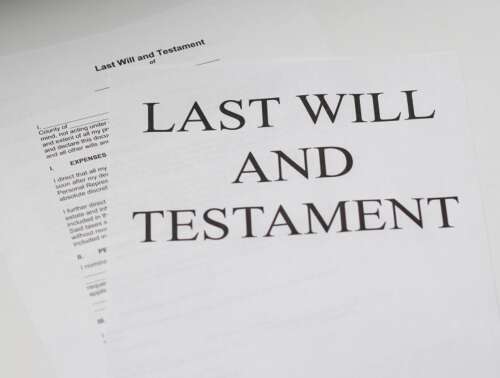Making a will is a very important part of estate planning. (Graphic: Melinda Gimbel)
Estate planning is an important aspect of your retirement plan, but some people, despite approaching their golden years, might not understand what it entails. So I hope this article helps you educate yourself on this important part of life as you plan to start your retirement.
It is the process by which decisions are made regarding the management and distribution of a person’s assets during their lifetime, in the event of the person’s incapacity or death. This involves making wills, preparing powers of attorney and establishing trusts. A power of attorney is an estate planning tool that allows you to appoint someone to make decisions on your behalf in the event of incapacity. The power of attorney terminates upon death. A will takes effect upon death.
Consulting qualified professionals, such as lawyers, accountants and financial advisors, greatly improves retirement and estate planning. Health problems can arise at any time and undermine the mental ability to make decisions for yourself. If you have accumulated assets and hope to leave a legacy to your loved ones, estate planning should be an integral part of your retirement planning. This is to take inventory of your belongings. You can consider co-ownership of assets, such as adding a joint account holder to your investment, but make sure it’s someone you trust. For seniors, adding a joint account holder can be beneficial in cases where a senior is unable to access funds due to location or health reasons. A joint account facilitates the transfer of assets in the event of the death of one of the parties. Making a will is always a good idea and saves a lot of headaches when settling an estate after the death of the owner. Think about who you want to benefit from your estate when you die. Choose beneficiaries of life insurance policies and other assets carefully. It is also proactive to consider beneficiaries in case the beneficiary dies while you are still alive or the beneficiary’s circumstances have changed. Choose executors wisely. An executor is the one who will be responsible for managing your assets after your death and will also oversee the distribution of your estate according to your will. Protect important documents relating to your estate.
Retirement planning is incomplete without focusing on estate planning. As long as assets are accumulated, estate planning becomes even more important to the retirement process.
Legacy
Receiving an inheritance can be a boon for some recipients. But how long does the inheritance last? What about death benefit proceeds received from an insurance policy? How much is reinvested? Is the proceeds being used to purchase or invest in assets that will appreciate in value, such as real estate, stocks, bonds, and business ownership? Inheritance proceeds can be used to supplement retirement income. Studies show that a third of people who receive an inheritance have no savings within two years. Most beneficiaries of an inheritance dispose of it quickly. It is advisable, as the beneficiary of an inheritance, to think carefully about controlling emotions and reducing the propensity to spend. Give yourself plenty of time to employ the right investment strategy to grow your legacy. Don’t be in too much of a rush to spend.
There are retirees concerned about creating generational wealth and concerned about succession planning. They recognized the need to seek advice from experienced, qualified and trustworthy advisors to organize their retirement portfolio. Beneficiaries of an inheritance can consider creating or replenishing their emergency fund. An emergency can strike at any time, and it can happen immediately after a spending spree. After securing your emergency fund, assess any high-interest debt. Proceeds from an inheritance can be used to pay off high interest debt such as credit cards. It may not be wise to pay off your mortgage using your inheritance, as your situation can change quickly. If you’re still in the workforce, you risk losing your job, and the inheritance could provide much-needed income to continue monthly mortgage payments and avoid the risk of running out of money and accumulating debt.
Grace G McLean is a Financial Advisor at BPM Financial Limited. Contact gmclean@bpmfinancial or visit the website: www.bpmfinancial.com. She is also a podcaster for Living Above Self. Email him at [email protected]
Man on the left in estate planning discussions with his lawyer
